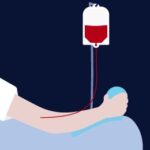Iron overload and iron chelation therapy

Blood transfusions are very safe in Australia. Red blood cell transfusions improve symptoms of anaemia such as:
- tiredness
- pale skin
- shortness of breath
- heavy legs
- difficulty concentrating
- weakness
- feeling lightheaded
- rapid or irregular heartbeat
Red blood cell transfusion can improve quality of life.
What is Iron?
- Iron is an important mineral in the body
- It helps to maintain bodily function and the immune system
- It is responsible for ensuring that oxygen is transported around the body by the red cells. This oxygen is used by the body to create energy.
Where does iron come from?
- The body does not produce iron. Iron is from the food we eat.
How much iron do we require?
Normally the body processes just enough iron from our diets to work effectively. The body is not able to get rid of large amounts of iron. It loses small amounts each day through our skin and cells. Most of the iron in our body is recycled.
Iron is distributed throughout the body. The largest amount is in our blood where it binds to oxygen. We also store iron in our bodies – particularly in the liver.
Iron overload
What is iron overload?
Iron overload occurs when there is excess iron in our body and normal iron stores are full. Excess iron deposits in organs such as the heart, liver and pancreas. This can lead to heart failure, liver damage and endocrine disorders like diabetes.
What causes iron overload?
- Medical conditions like haemochromatosis, myelodysplastic neoplasms (MDS) and thalassaemia sickle cell disease.
- Regular red blood cell transfusions, as blood contains a large amount of iron.
Symptoms of iron overload
- fatigue
- abdominal pain
- bronze/grey skin colour
- joint pain
- sexual dysfunction
- irregular heart rate
- weight loss
- hair loss
- depression
- elevated blood glucose levels
Screening and diagnosis of iron overload
A blood test known as a serum ferritin level can indicate if there is too much iron in your body. An elevated serum ferritin level over a period of time can indicate iron overload. Your treatment team will assess you for signs and symptoms of iron overload.
It is important to talk to your treatment team if you are having regular red blood cell transfusions. Your treatment team will discuss management of iron overload.
Iron chelation
The treatment of iron overload is called iron chelation therapy. Iron chelation medications bind to the iron. This allows the body to remove the excess iron through urine and faeces.
Iron chelating medications are:
- oral tablet – Deferasirox
- subcutaneous or intravenous infusion – Desferrioxamine
Iron chelating therapy is usually ongoing, or until your iron levels are normal. Your treatment team will tell when to take iron chelating medication and for how long.
Side effects of iron chelation therapy
- nausea
- vomiting
- dizziness
- diarrhoea
- rash
- muscle cramps
- red coloured urine
- vision and hearing changes
Sometimes side effects can impact quality of life. Your treatment team will discuss side effects and management options with you.
It is important to note that iron chelation therapy is not suitable for all people. Talk to your treatment team about the possibility of iron overload.
Useful links
Further information can be found on the following web site explaining iron overload and its treatment in greater detail: www.lifeblood.com.au.
References
Last updated on May 1st, 2024
Developed by the Leukaemia Foundation in consultation with people living with a blood cancer, Leukaemia Foundation support staff, haematology nursing staff and/or Australian clinical haematologists. This content is provided for information purposes only and we urge you to always seek advice from a registered health care professional for diagnosis, treatment and answers to your medical questions, including the suitability of a particular therapy, service, product or treatment in your circumstances. The Leukaemia Foundation shall not bear any liability for any person relying on the materials contained on this website.